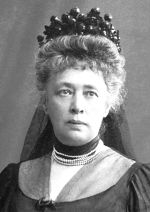Bertha von Suttner
Bertha von Suttner
The Nobel Peace Prize 1905
Generalissimo, Peace Movement. Author, ‘Lay Down Your Arms‘. Permanent International Peace Bureau. Vigorously opposed militaristic traditions. Eternal truth: happiness created, developed in peace. Eternal right: individual’s right to live.
“Inform me, convince me, and then I will do something great for the movement”, Alfred Nobel said to Bertha von Suttner.”
Biography
Books
Collected Papers
Humor/Quotations
Video
Honoring Suttner
Country
Death
Family
Health
Youth
Humor/Quotations
- Alfred Nobel also saw a shorter and more direct way before him. He wrote to me: “It could and should soon come to pass that all states pledge themselves collectively to attack an aggressor. That would make war impossible, and would force even the most brutal and unreasonable Power to appeal to a court of arbitration, or else keep quiet. If the Triple Alliance included every state instead of only three, then peace would be assured for centuries.”
- Alfred Nobel had good reasons for choosing to entrust the administration of the funds of his peace legacy to the Norwegian Parliament.
- “If you keep me in touch with developments, and if I hear that the Peace Movement is moving along the road of practical activity, then I will help it on with money.” Alfred Nobel to Bertha von Suttner.
- Alfred Nobel’s will showed that he had gradually become convinced that the movement had emerged from the fog of pious theories into the light of attainable and realistically envisaged goals. He recognized science and idealistic literature as pursuits which foster culture and help civilization. With these goals he ranked the objectives of the peace congresses: the attainment of international justice and the consequent reduction in the size of armies.
- Alfred Nobel believed that social changes are brought about slowly, and sometimes by indirect means. He contributed 80,000 francs to Andrée’s attempt to cross the North Pole. He wrote to me that this could contribute more to peace than I would believe. “If Andrée attains his goal, or even if he only half attains it, it will be one of those successes that stimulate a spate of talk and excitement which open the way for the generation and acceptance of new ideas and new reforms.”
- Theodore Roosevelt offers arbitration treaties to all countries and speaks the following words in his message to Congress, “It remains our clear duty to strive in every practicable way to bring nearer the time when the sword shall not be the arbiter among nations.” [President Theodore Roosevelt’s fifth annual message to the U.S. Congress, December 5, 1905.] chuck pl link hl to TR page
- One of the eternal truths is that happiness is created and developed in peace, and one of the eternal rights is the individual’s right to live.
- I wish to dwell for a moment on the subject of America. This land of limitless opportunities is marked by its ability to carry out new and daring plans of enormous imagination and scope, while often using the simplest methods. In other words, it is a nation idealistic in its concepts and practical in its execution of them.
- The strongest of all instincts, that of self-preservation, is an assertion of this right, affirmed and sanctified by the ancient commandment “Thou shalt not kill.” It is unnecessary for me to point out how little this right and this commandment are respected in the present state of civilization. Up to the present time, the military organization of our society has been founded upon a denial of the possibility of peace, a contempt for the value of human life, and an acceptance of the urge to kill.
- ….These things are called ideals as long as they exist in the realm of ideas; they stand as achievements of progress as soon as they are transformed into visible, living, and effective forms.
- And so it is. However clearly envisaged, however apparently near and within reach the goal may be, the road to it must be traversed a step at a time, and countless obstacles surmounted on the way.
- Thus pacifism faces no easy struggle. This question of whether violence or law shall prevail between states is the most vital of the problems of our eventful era, and the most serious in its repercussions.
- The advocates of pacifism are well aware how meager are their resources of personal influence and power. They know that they are still few in number and weak in authority, but when they realistically consider themselves and the ideal they serve, they see themselves as the servants of the greatest of all causes.
- “Europe is one” [Bertha von Suttner stated that uniting Europe was the only way to prevent the world catastrophe, World War I, which seemed to be coming].
- When Theodore Roosevelt received me in the White House on October 17, 1904, he said to me, “World peace is coming, it certainly is coming, but only step by step.”
